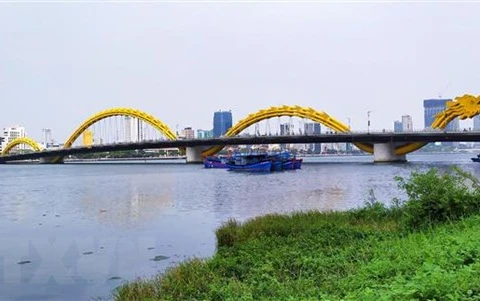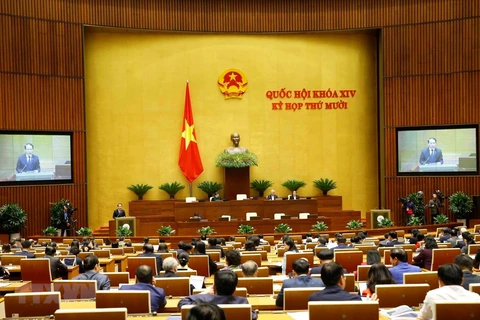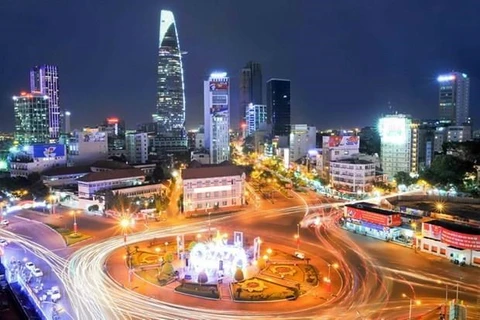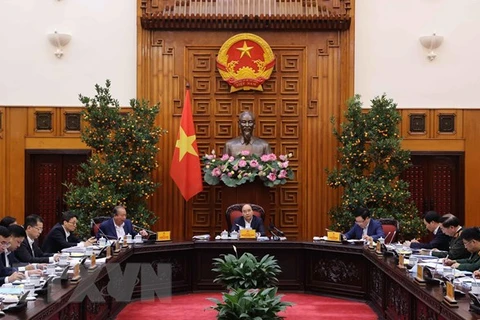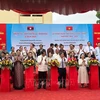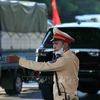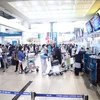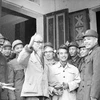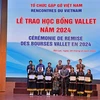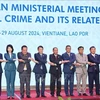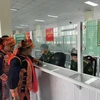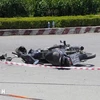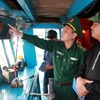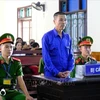 The urban administration model in Hanoi is expected to create many breakthroughs to better serve the people. (Photo: VNA)
The urban administration model in Hanoi is expected to create many breakthroughs to better serve the people. (Photo: VNA) Hanoi (VNA) - An urban administration model, which has been piloted at the ward level in the capital city of Hanoi from July 1, is expected to create many breakthroughs to better serve the people.
This model aims to promote the activeness, responsibility and creativeness in serving the people and promoting the city’s socio-economic development.
Promoting activeness and creativeness of ward-level authorities
After the Government issued Decree No. 32/2021/ND-CP dated March 29, 2021 detailing and taking measures to implement Resolution No. 97/2019/QH14 dated November 27, 2019 of the National Assembly on piloting an urban administration model in Hanoi, the municipal People's Committee issued Plan No.100/KH-UBND on April 12, 2021 to implement the Decree.
Notably, under the decree, there will no longer be ward-level People’s Councils in Hanoi. It means that instead of having both a People’s Committee and a People’s Council, each ward will be governed only by a People’s Committee.
The organisational structure of the committee will also be changed. Instead of having only a chair, vice chairs and members, the new ward-level People’s Committee will also have a police chief, a military commander, and other officers performing different functions.
The chair will hold decision-making power and be responsible for everything that happens in the committee.
They can also authorise justice and civil status officers to make copies and notarise copies of the people’s original documents instead of having to do it themselves.
Officers working for these new ward-level People's Committees will have the same rights and obligations as those working in their respective district-level People’s Committees.
Each ward-level committee should have an average number of 15 officers, according to the decree, but it's not necessarily the same for every committee.
According to Le Tuan Dinh, Chairman of the People’s Committee of Dong Da district, the model is hoped to satisfy organizations and individuals, and promote the socio-economic development of the district in particular, thus contributing to the development of the capital in general.
Meanwhile, Chairwoman of the People’s Committee of Hoan Kiem district’s Tran Hung Dao ward Phung Phuong Thao expressed her hope that the model will create breakthroughs towards better serving local people.
Creating breakthroughs in administrative reforms
The pilot of the model is expected to not only promote the ability of officials, but also create new breakthroughs in administrative reforms.
One of the key aspects of this model in Hanoi is that ward-level People’s Committees work as local state administrative agencies and the chairs are leaders, which will ensure a democratic focus and help modernise the administrative sector.
According to Thao, judiciary and civil servants are authorized to sign authentication and this will help reduce the work load of officials of the ward-level People's Committee, so that the Chairpersons and Vice Chairpersons can focus on directing and resolving affairs of the locality.
Sharing Thao’s view, Vuong Quoc Tien, Vice Chairman of the People’s Committee of Thanh Luong ward of Hai Ba Trung district emphasized that the model truly geared towards administrative reforms and serving the people.
Although there is no ward-level People's Council in 12 districts of Hanoi and Son Tay township, the people's democratic rights and supervision are still protected and strengthened, said Vu Thu Ha, Director of the municipal Department of Home Affairs.
The Urban governance model has been also be piloted in HCM City and Da Nang city from July 1.
Instead of closing down ward-level People's Council like Hanoi, these two cities will remove district-level People's Councils from their administrative systems.
Deputy Minister of Home Affairs Tran Tuan Anh said that wherever it is implemented, the pilot process would make good use of the cities’ civil officer resources.
It will also help the cities to be more proactive, responsible and creative in serving the people, making them happy and speeding up the socio-economic developments, he noted./.

